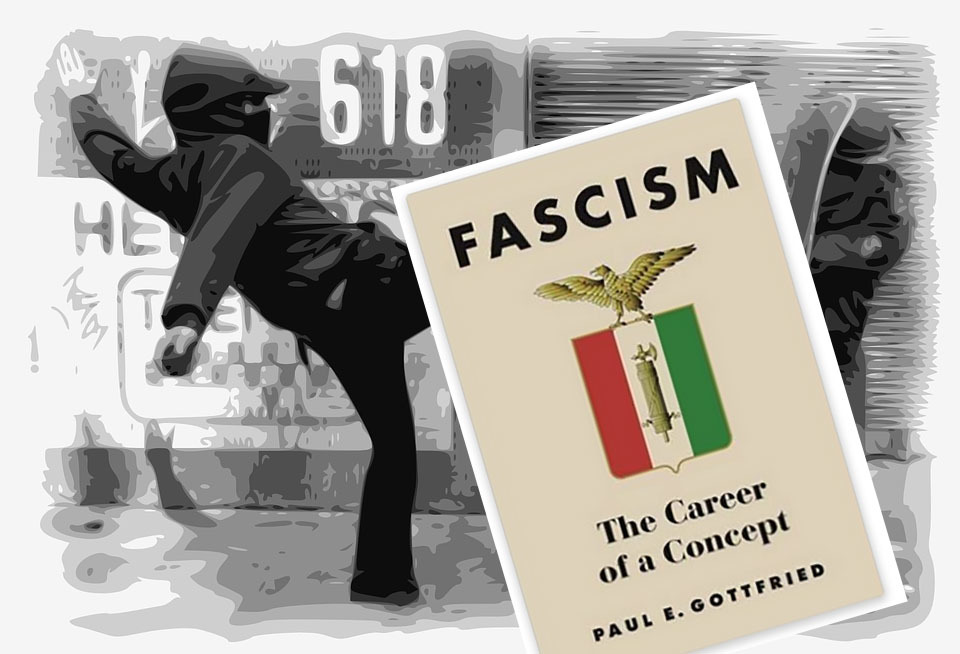Review of Fascism: The Career of a Concept, Paul E. Gottfried (Northern Illinois University Press 2016), 256 pages, ISBN-13: 978-0875804934; $39.92 on Amazon.com
Words have power, and learning and understanding the true meaning of words a culture uses gives one insight into the culture.
Similarly, by studying the evolution of words, one gains insight into the culture’s evolution as well.
Fascism: The Career of a Concept is authored by Paul Gottfried, a humanities professor emeritus at Elizabethtown College. Fascism tracks the evolution of the word “fascism,” how use of the term has changed compared to its twentieth century roots, and how the word’s evolution reflects changes in American society and Western civilization.
‘What Evil Lurks’
Fascism may be challenging for readers not normally interested in political philosophy, but Gottfried’s extensive research, which covers more than 50 studies and books on the topic, makes the read well worth the effort, especially for those seeking a fascinating and unique peek into the philosophy of what Orson Welles’ radio character, The Shadow, famously intoned as “what evil lurks in the minds of men.”
Just as the meanings of words such as “conservatism” and “liberalism” have changed over time, Gottfried says the term “fascism” is too often used arbitrarily and is now regularly employed to characterize policies opposed by modern liberalism. In contrast to this use of the term, as one of condemnation against those who oppose expansion of government, Gottfried notes modern “fascism” is a word coined by Benito Mussolini and other partisan leaders. They used it to express their idea of an active and populist government’s responsibility to restrict economic behavior and promote nationalism.
“Those who stand in the way of social change and whose ‘bigotry’ must be addressed and are conveniently dismissed in Western Europe as ‘fascist,’ an epithet that has an added value because it is no longer associated with state corporatism and other now widely ignored but once-essential features of fascism,” Gottfried writes. “Calling someone a fascist today means that he or she is a Nazi.”
Words and Meanings
In reading the book, one will learn fascism and Nazism, another theory of government closely associated with World War II-era Europe, are commonly and incorrectly conflated. Although Mussolini was, by definition, a fascist, Nazi Germany operated under a more eclectic totalitarian philosophy, borrowing from fellow dictator Joseph Stalin’s operational theories and common corporatism.
Unlike Nazism’s völkisch (populist) quest to reclaim the glory of esoteric ancestor races, such as the Hyperboreans, fascism is a rejection of religion in favor of scientism, Gottfried writes.
“When Italian fascists spoke of building a new age of the world, commencing with Mussolini’s March on Rome in 1922, they were not simply expressing nostalgia for past Latin glory: they believed themselves to be living in a modern society that looked forward to a new political order that was not parasitic on Roman symbols and Roman notions of authority,” Gottfried wrote. “Fascists considered themselves the beneficiaries of the Italian democratic revolutionaries of the nineteenth century, and it was their destiny to erect a state-of-the-art regime that differed equally from old-fashioned Italian principalities and corrupt liberal parliamentary administrations. They also incorporated the secularizing tendencies that had become decisive in the West starting with the Enlightenment, and fascists proposed, however tentatively, a post-Christian vision heavily shaped by science and religious skepticism.”
Mirror Ideological Image
Gottfried says fascism is essentially a twisted, funhouse-mirror image of twentieth century liberal theories of humanity’s perfectibility. Despite fascists’ strong opposition to the revolutionary left and the common characterization of fascism as “right-wing,” fascism was radically different from modern-day conservatism.
“Although fascists could claim a multifarious genealogy going back to nineteenth century counterrevolutionaries, critics of rationalism, and even Italian futurists, its ideology was contrived to lend credibility to a movement of resistance,” Gottfried wrote. “Unlike Marxism and Christianity, fascism was an essentially reactive movement, and its oppositional nature could be grasped most clearly by looking at its ‘escape from transcendence.’ Fascists rejected a leitmotif that appeared in Christian theology and throughout the revolutionary Left, namely that human beings could be morally transformed and raised above their natural conditions to become more fully human or less beastlike.
“The fascists exalted what was primordially collectively, or biologically rooted, and in the end pieced together a counter-vision to the teachings of their enemies,” Gottfried wrote.
Warning from the Past
Gottfried says although fascism was once a revolutionary movement, it is now exceedingly rare, existing “in the West as an isolated or only remotely approximated curiosity.”
In the United States and other Western cultures, there are no mainstream political parties or movements resembling anything accurately described as “fascist.” Instead of a present danger to nations’ character, this flavor of tyranny casts its long shadow across the world as a reminder of the abuses and mistakes of the past.
Although the book may be challenging to some readers, Fascism: The Career of a Concept is a meticulously researched primer on the true history of one of the world’s worst ideologies. Upon finishing the book, readers will emerge with a firmer understanding of history, philosophy, and the ways in which words shape culture and reality.
Jay Lehr, Ph.D. ([email protected]) is science director of The Heartland Institute.





